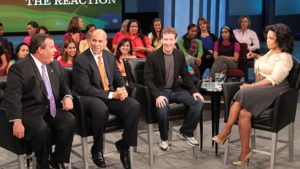This morning President Obama spoke at the National Urban League to address criticism that Race To The Top (and education reform in general) is neglecting poor urban minority school districts. Here’s President Obama, as reported on the New York Times website:
All I’m asking in return, as a president and as a parent is a measure of accountability. Surely we can agree that even as we applaud teachers for their hard work, we need to make sure they’re delivering results in the classroom. If they’re not, let’s work with them to help them be more effective. And if that fails, let’s find the right teacher for that classroom.
But we can’t even agree on that, certainly in New Jersey. NJEA’s leadership is fierce in its opposition to salary differentiation among teachers based on performance. A new analysis out from the Education Commission of the States on “Pay for Performance Proposals in Race To The Top Round II Applications” (hat tip: NJ Spotlight) shows that NJ had the second lowest percentage of districts – local school boards and superintendents, not NJEA affiliates – that signed off on using teacher evaluations to inform compensation. (NJ’s percentage for LEA’s was 34% and Ohio was 21%. I didn’t count the states using small pilot programs instead of State-led initiatives because the difference skews the approval rate.)
To some it’s obvious, and well-expressed by Megan McArdle in The Atlantic Monthly:
Imagine a setting where you care about performance (e.g. a professional football team, or a currency trader). You wouldn’t think of granting tenure. So why do it in academics?
“Lifetime drycleaning”? “Permanent tax advisor”? When an academic starts pushing the tenure model for anywhere outside academia, I will find their defense of its use in academia more convincing.
To others it’s not. (See Bruce Baker’s post at SchoolFinance101 on why we can’t use value-added assessments for teachers.) But there’s something deeper driving the opposition to basic elements of ed reform from traditional defenders of poor minority kids like The National Urban League, NAACP, Education Law Center (for a Jersey example) and other civil rights groups. In fact, this week a group that includes the National Urban League, NAACP, Lawyers’ Committee for Civil Right Under Law, et. al. published a “new comprehensive blueprint…to ensure all public school students have the opportunity to achieve high academic standards” (according to Education Law Center’s press release) called Opportunity to Learn, which would use NJ school funding under Abbott as a national model. The group also calls for ending Race To The Top because it promotes “ineffective approaches for turning around low performing schools and education systems.”
The irony, of course, is that many ed reformers (see Education Equality Project’s home page) view programs that promote teacher accountability like RTTT as key to ameliorating decades/centuries of segregated and discriminatory education in America. But there’s an (increasing?) backlash from groups with exactly the same goals. Somehow the idea of increased federal funding for innovation – like higher pay for great teachers – and its corollary, no increased money for status quo schooling, is seen as undermining pillars that support poor kids.
There’s a component about race here also. Feel free to chime in.
At any rate, such opposition is troubling, and more than a matter of perception or insufficient marketing or economic concerns or the influence of labor unions (though there is all that too). The movers and shakers among ed reformers might want to address this awkward resistance squarely rather than waiting for it to peter out. I don’t think it will.
Update: check out PoliticsK-12 for the evolving craziness behind whether or not the National Urban League and six other civil rights group back Race To The Top:
I just talked to the Rev. Sharpton. He told me that the critical framework was “prematurely released” and that his National Action Network, the NAACP, and the Urban League, are actually not supporters of the framework. He added that these three groups didn’t have “concerns” about the President’s education agenda, but “questions,” which were addressed in a Monday meeting with administration officials. In fact, the Rev. Sharpton said, “I agree with [the president]…I’m prepared to fight for a lot of what he’s saying.”




2 Comments